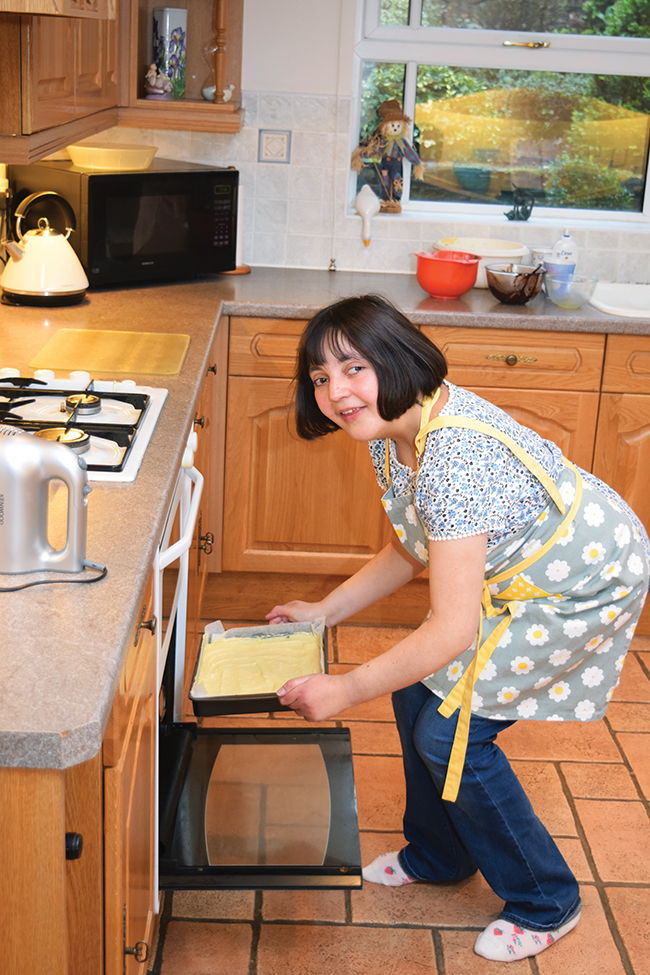Aspiring baker Lisa Satur turns adversity into opportunity to bring her passion to the public forum…

I am 24 years old and was born with a number of medical problems that required a great deal of treatment in my first years of life. Of these, swallowing difficulties associated with severe reflux, was a significant issue. I could not feed normally for the first two or three years of my life and my dietary needs were a nightmare for my parents.
When I did start eating normally there were a number of foods that suited me most, like light pastries and cakes. The drink that suited me until my late teenage years was milk. As the years have gone on I have been able to enjoy other foods and have developed an ability to eat and tolerate most foods, but banana remains on the blacklist.
From the age of seven my chosen career was a baker, seemingly improbable due to my physical disabilities. Nevertheless, after finishing school, I pursued a catering course at sixth form college. I completed the first year, but as the course was aimed at training personnel for work in professional kitchens, an unrealistic goal for me, I reluctantly left.
I was left, in my later teenage years, unemployed. Despite sending out numerous job applications, all were unsuccessful. Meanwhile my mum and I used to bake cakes at home for us as a family to enjoy, passing the time and exercising my passion. We discussed whether it would be a possible to bake and sell my cakes, but I wasn’t quite sure anyone would enjoy my cakes sufficiently to buy them. Nevertheless, we tried out my tray bake cakes on members of my dad’s amateur orchestra and they proved to be a hit. This was just a single tray bake once a week, but a small and positive outcome.
Adapting to new demands
Around about this time I started to develop a new medical problem, which was devastating. I was 21 years old and I had developed severe gastrointestinal disturbance, in particular diarrhoea, that was frequent and uncontrollable. I was investigated at the local hospital for gluten and lactose intolerance.
While I was being investigated we tried to live a normal life by adapting to the demands of a diet that was gluten and lactose-free. This proved to be a task that was far from easy. I remember taking my Grandma out for a meal that did not contain either gluten or milk – it was almost impossible.
I was diagnosed as having very severe lactose intolerance. My mum and I researched the foods that did not contain lactose, only to find that almost every kind of food imaginable contains it: crisps, margarine, soup, cakes, pies, chocolate, etc.
Establishing a normal daily diet was a mammoth of a task.
Following the first experience of café or restaurant food, there were many almost universally distressing, traumatic and disappointing experiences that followed. Starters frequently contained cream, the mains’ sauces were milk-based and desserts to this day remain an unimaginative combination of meringue, fruit salad and sorbet. Yet my holidays abroad proved this did not need to be the case. The resort we stayed at provided a full and varied menu.
From small acorns…
Although it was initially hard going, I considered using this experience in a positive way. I adapted my cake recipes to be lactose-free and I experimented selling my cakes at church on Sunday, which proved successful. We then explored marketing lactose-free cakes to local cafés. Some wanted them, but many also wanted gluten-free cakes so I started adding these to my repertoire.
As I started getting regular orders I got help from the government scheme supporting small businesses. While this is not as yet a big concern, it has a positive look to the future.
I now have a good understanding of how to manage the lactose-free diet and remain hopeful that restaurants will start to address the needs of lactose-free clients, as this problem affects a wide range of people. I am hopeful in the future they will create more interesting menus that are truly lactose-free.
